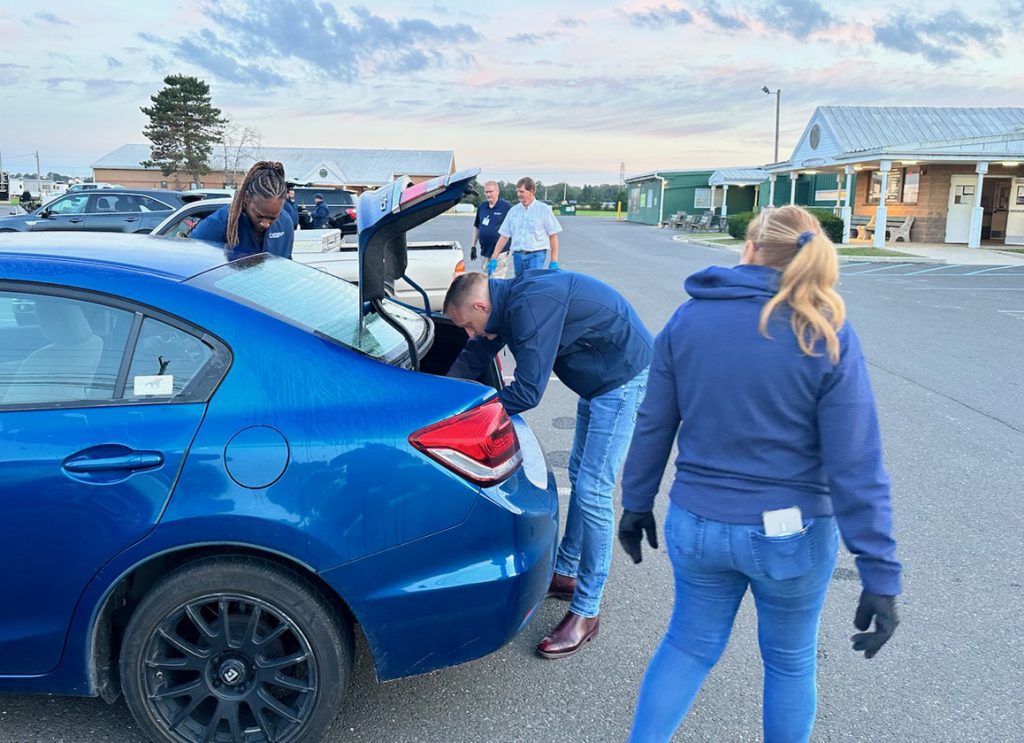Uncovering loaded needles and syringes to apprehending an assistant starter who was in possession of a controlled substance, seasoned integrity teams conducted searches and seizures last week across a pair of Keystone State racetracks.
Led by the Pennsylvania State Horse Racing Commission staff, the sweeps took place first in Erie at Presque Isle Downs before spending three days downstate at Parx Racing in Bensalem through Saturday's GI Pennsylvania Derby.
As part of their integrity program, the Commission once again put together a group of investigators–this time from nine states, plus representatives from England–and set them to work policing the barns and stable gates.
“We do this as part of our commitment to the integrity of horse racing in the Commonwealth and for the safety and security of the horses involved,” said Director of Enforcement, Jason Klouser. “The Commission is able to assemble such a large team of investigators through the contacts made from the Organization of Racing Investigators, whose members are the best and brightest when it comes to enforcement at their local tracks.”
The Organization of Racing Investigators, known as ORI, is a membership organization composed of specialists who are employed by state racing commissions and racetracks. The members' tradecraft helps protect the sport and perform a myriad of duties from combating allegations of race fixing, stopping horse doping, and breaking up nefarious activities in the barn areas. Their network fights a host of other offenses which are committed against equine athletes. The Pennsylvania Racing Commission is a regulatory agency, however, ORI members in various other states are commissioned law enforcement agents. No matter their standing, all investigators are essential when it comes to enforcing the rules.
In the lead up to the big day at Parx, the Commission's integrity teams moved across the state in an effort to maintain the integrity of horse racing in the Commonwealth.
“The Commission utilizes all industry assets at our disposal to ensure a level playing field for all participants,” Klouser said.
Conducting enforcement operations in the barn area and searching vehicles entering the stable gate at both Presque Isle Downs and Parx yielded results.
Based on updates through the Commission's website, Ruling No. 23096PI was handed down to trainer William Joseph Dowling, when a search found him with two loaded needles and syringes. The 6-year-old dark bay state-bred gelding Saketumi (Maclean's Music) was scratched from the seventh race Sept. 18 and a summary suspension was issued by the board of stewards Sept. 21.
Shifting the search to Parx last Friday and Saturday, Assistant Starter Luis A. Gonzalez Jr. was found in possession of a controlled substance and paraphernalia. Ruling No. 23254PP indicated that Gonzalez was in possession of a methamphetamine pipe containing residue and marijuana. He was summarily suspended by the Parx Board of Stewards Sept. 22.
“The Pennsylvania Horse Racing Commission is incredibly proactive at the state level and will continue to liaise with organizations in order to strengthen the integrity of horse racing and the health and safety of the equine athletes,” said Klouser. “The Racing Integrity Team was a collaborative effort between the Pennsylvania State Horse Racing Commission, Parx Racing, Presque Isle Downs, and the Pennsylvania Thoroughbred Horsemen's Association.”
Click here to access the state's rulings portal.
The post Keystone Integrity Teams Sweep Presque Isle To Parx appeared first on TDN | Thoroughbred Daily News | Horse Racing News, Results and Video | Thoroughbred Breeding and Auctions.

